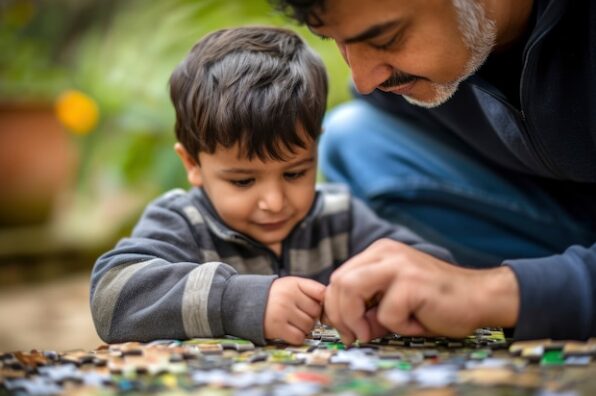For children with Autism Spectrum Disorder (ASD), social skills development can be both challenging and integral to their overall growth and well-being. In fact, social skills are a crucial aspect of human interaction, facilitating meaningful connections and successful communication. These skills enable children to express emotions, establish friendships, and share with others. Challenges autistic face while understanding and navigating social cues, norms, and expectations. Are extremely unique However, you can empower your children and help them build meaningful connections and independence through targeted interventions and support. Let’s find out more!

How Does Autism Impact Social Skills?
Autism is a neurodevelopmental disorder, so it’s important to first understand how and why autism affect social skills. Well, it affects the behaviour, communication, and social interaction of children. Autistic kids often find it difficult to understand social cues, interpret the facial expressions of others, and maintain eye contact. As a result of this, their social responses are not atypical. They may find it challenging to initiate interactions or respond appropriately to social stimuli, which can lead to feelings of isolation. While each child with autism is unique, these common traits make targeted interventions necessary to help them overcome social hurdles. These challenges experienced by autistic kids can lead to feelings of isolation, frustration, and a diminished quality of life if left unaddressed.
List of Social Skills For Autism
- Emotional Recognition: Autistic children struggle to recognise not only their own emotions but also the emotions of others around them.
- Conversational Skills: They find it difficult to understand body language and maintain eye contact which prevents them from communicating effectively.
- Empathy: It’s a common misconception that autistic children lack empathy. On the contrary, they are highly sensitive to emotions and all they need is encouragement to show empathy.
- Initiating and Maintaining Friendships: Their lack of communication skills stands as a barrier in forging meaningful relationships with others.
How to Nurture Social Skills?

Structured Playdates
To achieve social skills goals for autism it is essential that your child becomes comfortable with other children and engages in play with them. Create structured play sessions that focus on specific social skills, such as turn-taking, sharing, and eye contact. But do remember to provide clear guidelines during play can help children with autism feel more comfortable and engaged. These play sessions can help autistic children observe and replicate appropriate social behaviours, improving their ability to communicate and engage with peers.
Visual Supports
In order to improve your little one’s social skills, you can utilise visual aids, like social stories and picture schedules, to help them understand social expectations and routines. Visual cues can enhance their comprehension and reduce anxiety in unfamiliar situations. They utilise pictures, words, and prompt cards tailored to the child’s learning preferences. By depicting various social scenarios, visual aids prepare autistic kids for real-life interactions, offering a blueprint for conversation topics, gameplay routines, and the social expectations they may encounter.
Types of Visual Support:
Visual Schedules
Taking advantage of the structured nature of visual schedules can significantly improve the daily routine of children with autism, offering them a clear roadmap of expected activities and transitions. This is especially effective in teaching social skills to students with autism. When consistently applied, visual schedules serve as an effective reinforcement technique, enhancing the ability of autistic children to use social skills in various settings as it provides a sense of predictability.
Picture Exchange System
Picture Exchange Systems, as a form of visual support, is also an important structured approach to bolster the development of social skills in children with autism by facilitating communication and enhancing learning experiences. It helps autistic kids by prompting conversation topics and guiding gameplay sequences
Social Stories
Building upon the foundation provided by Picture Exchange Systems, creating social stories is another technique that employs visual support to enhance the social skill. It includes pictures and words which act as visual cues to help your child learn and recall appropriate social behaviours. It also includes tailored scenarios which match real life scenarios to help them grasp social situations.
Modelling and Role-Playing
One of the most effective ways to build social skills in autistic children is to demonstrate appropriate social behaviours through modelling and engaging in role-playing activities. So you can create different social settings for them within their home setting and play out various real-life conversations. By practising scenarios like greetings or conversations, children can learn and apply new skills in a safe environment. You can simulate social interactions that help children anticipate and practice responses in various settings. You can also teach and reinforce the recognition of different expressions and cues in a dynamic but safe context. This can help enhance autism friendship skills.
Positive Reinforcement
Another effective way to improve social skills in autistic children is to offer praise and rewards for displaying desired social behaviours. This is known as positive reinforcement. Positive reinforcement can motivate children to engage in social interactions and build their confidence. Positive reinforcement, such as praise for successful interactions, further motivates and reinforces the desired behaviours. You can encourage children using natural interactions with peers to reinforce positive social behaviour, allowing them to learn from one another in an organic setting. You can also create groups with clear expectations and appropriate support to provide a safe environment for practising social skills.
Sensory Considerations
If you want to understand how to help autistic children with social skills, you have to understand their world and empathise with them. Recognize and accommodate sensory sensitivities that may impact social interactions. Creating sensory-friendly environments can help children feel more at ease during social engagements. If their environment accommodates their unique needs, then they’ll be less anxious and more open to communicating effectively with their peers.

Additional Resources
Dealing with autistic kids is not an easy job for parents. Providing social skills training in autism requires a lot of effort and patience. This is why it’s best to take advantage of all the available resources at your disposal. There are several government and non-government institutions who provide support for autistic kids and provide aid in their social skill development including:
Action For Autism: Indian non-profit, education, training and advocacy organisation which provides support, and resources for families and professionals.
The National Trust: This is a trust by the Indian Ministry of Social Justice that offers programs and schemes for the welfare of people with autism.
Autism Society of India: This is also a non-government organisation with over 800 members across India and the society focuses on advocacy, awareness, and support for individuals with autism.


